7 Best Herbal Tinctures For Shortness Of Breath
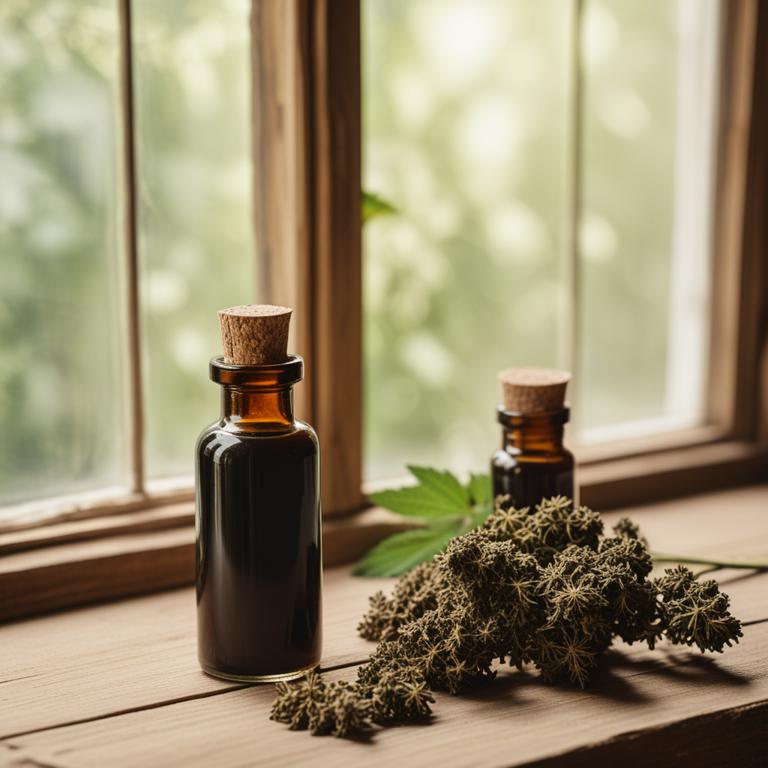
Herbal tinctures for Shortness of breath are liquid extracts made from plants, herbs, and other botanicals that have been used for centuries to alleviate respiratory issues and improve lung function.
These natural remedies have gained popularity due to their potential benefits, including relaxation of airways, increased oxygenation, and enhanced respiratory health, allowing individuals to breathe more easily.
Examples of herbal tinctures used to treat shortness of breath include Peppermint, which helps relax the airways and reduce inflammation, Ginger, which aids in digestion and reduces congestion, Echinacea, which boosts the immune system and fights off infections, and Licorice Root, which soothes the respiratory tract and reduces inflammation.
Additionally, other herbal tinctures like Thyme, Oregano, and Wild Indigo have antimicrobial properties that help combat respiratory infections, while Ginkgo Biloba and Eleuthero are believed to improve circulation and reduce oxidative stress in the lungs.
According to "Phytomedicine : international journal of phytotherapy and phytopharmacology", tinctures for shortness of breath can be beneficial due to natural compounds such as gallic acid and quercetin, which have antioxidant and anti-inflammatory effects that can help improve lung emphysema and alleviate symptoms of shortness of breath.
Below there's a list of the 7 best herbal tinctures for shortness of breath.
- 1. Ginkgo biloba tinctures
- 2. Echinacea purpurea tinctures
- 3. Andrographis paniculata tinctures
- 4. Curcuma longa tinctures
- 5. Astragalus membranaceus tinctures
- 6. Euphorbia peplus tinctures
- 7. Eleutherococcus senticosus tinctures
Also you may be interested in...
TODAY'S FREE BOUNDLE
Herb Drying Checklist + Herbal Tea Shopping List + Medicinal Herbs Flashcards
Enter you best email address below to receive this bundle (3 product valued $19.95) for FREE + exclusive access to The Aphotecary Letter.
$19.95 -> $0.00
1. Ginkgo biloba tinctures

Ginkgo biloba tinctures have been traditionally used to treat shortness of breath, also known as dyspnea, due to their ability to improve blood circulation and oxygenation to the lungs.
The properties of Ginkgo biloba tinctures, including flavonoids and terpenoids, help to dilate blood vessels and improve the body's ability to transport oxygen, thereby alleviating shortness of breath.
The bioactive constituents, such as bilobalide and ginkgolides, work together to inhibit platelet-activating factor (PAF) and improve nitric oxide production, which helps to relax blood vessels and increase oxygen delivery to the body's tissues.
Regular use of Ginkgo biloba tinctures has been shown to provide relief from shortness of breath and improve overall respiratory function, making it a beneficial herbal preparation for individuals suffering from this condition.
2. Echinacea purpurea tinctures

Echinacea purpurea tinctures have been traditionally used to help alleviate symptoms of shortness of breath, also known as dyspnea, which is often associated with respiratory conditions such as bronchitis and asthma.
This herbal preparation contains bioactive constituents like alkylamides, flavonoids, and phenolic acids that help to reduce inflammation, improve respiratory function, and boost the immune system, ultimately contributing to the relief of shortness of breath symptoms.
The benefits of using Echinacea purpurea tinctures to treat shortness of breath include reduced severity and frequency of episodes, improved lung function, and a lower risk of complications.
Regular use of Echinacea purpurea tinctures may also help to promote overall respiratory health and well-being, making it a popular natural remedy for individuals seeking alternative treatment options.
Related Study
According to "Molecular nutrition & food research", Echinacea purpurea tinctures for shortness of breath do not appear to be a risk to consumers.
3. Andrographis paniculata tinctures
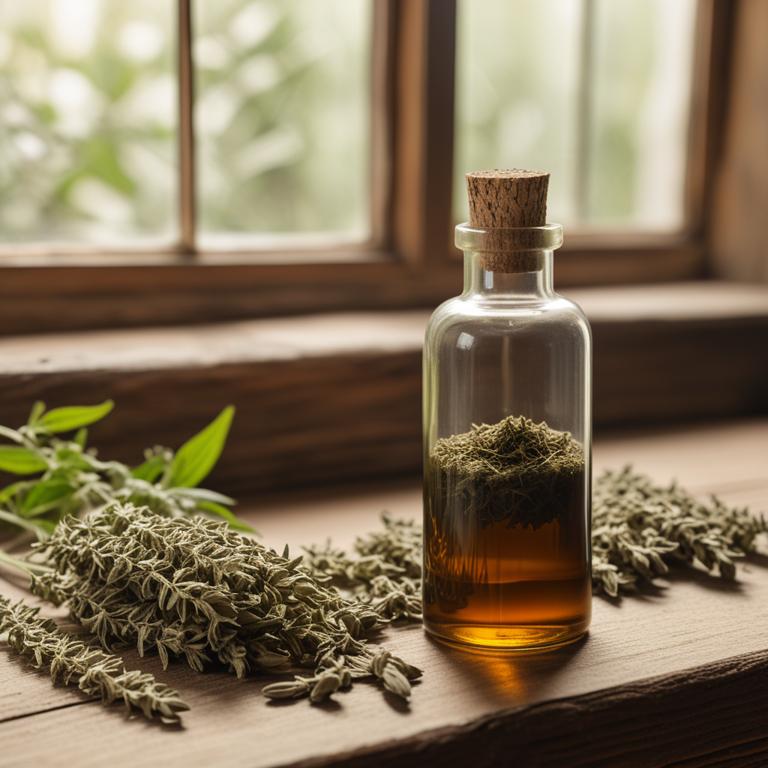
Andrographis paniculata tinctures have been traditionally used to treat shortness of breath, a common symptom of various respiratory and cardiovascular conditions.
The anti-inflammatory, antioxidant, and immunomodulatory properties of this herbal preparation help to reduce inflammation and improve lung function, thereby alleviating shortness of breath.
The bioactive constituents, including andrographolide, neoadrographolide, and andrographiside, have been shown to inhibit pro-inflammatory enzymes, reduce oxidative stress, and modulate the immune system, ultimately helping to treat shortness of breath.
By using Andrographis paniculata tinctures, individuals can benefit from improved respiratory function, reduced inflammation, and enhanced overall well-being, making it a potential natural remedy for shortness of breath.
Related Study
According to "Journal of natural products", Andrographis paniculata tinctures may help alleviate shortness of breath by reducing inflammation and oxidative damage in the lungs, as supported by the study that showed andrographolide effectively reduced lung cellular infiltrates and decreased pro-inflammatory cytokine levels.
4. Curcuma longa tinctures

Curcuma longa tinctures, derived from the rhizome of the Curcuma longa plant, have been used to alleviate symptoms of shortness of breath due to their anti-inflammatory and antioxidant properties.
The bioactive constituents, including curcuminoids and polyphenols, help to reduce inflammation and oxidative stress in the lungs, thereby improving breathing capacity and overall respiratory function.
By modulating the inflammatory response and protecting lung tissue from damage, Curcuma longa tinctures may help to treat shortness of breath associated with conditions such as chronic obstructive pulmonary disease (COPD) and asthma.
The benefits of using Curcuma longa tinctures to treat shortness of breath include improved lung function, reduced symptoms of wheezing and coughing, and enhanced overall quality of life.
Related Study
According to "International journal for vitamin and nutrition research. Internationale Zeitschrift fur Vitamin- und Ernahrungsforschung. Journal international de vitaminologie et de nutrition", Curcuma longa tinctures may help alleviate shortness of breath by reducing tracheal responsiveness and lung pathological features, as seen in a study where rats sensitized to ovalbumin showed improved symptoms after treatment with Curcuma longa extract.
5. Astragalus membranaceus tinctures
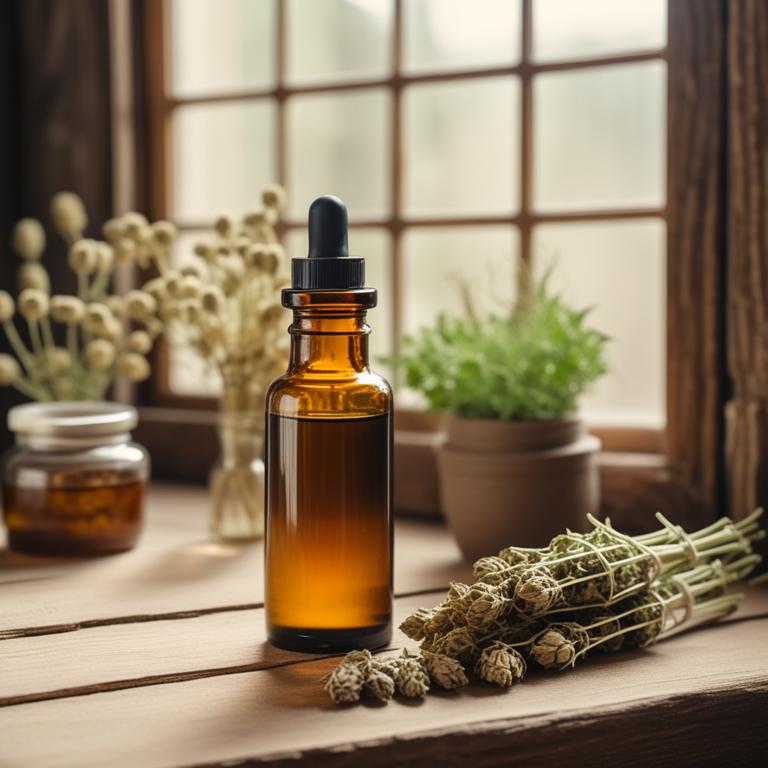
Astragalus membranaceus tinctures have been traditionally used to treat shortness of breath by leveraging its adaptogenic and anti-inflammatory properties.
The bioactive constituents of Astragalus membranaceus, including flavonoids and saponins, help to improve lung function and increase oxygenation, thereby alleviating symptoms of shortness of breath.
By enhancing the body's ability to adapt to stress and promoting the healing of lung tissue, Astragalus membranaceus tinctures can help to reduce respiratory distress and improve overall respiratory health.
The benefits of using Astragalus membranaceus tinctures to treat shortness of breath include improved lung function, reduced inflammation, and enhanced overall well-being, making it a promising natural remedy for this common ailment.
6. Euphorbia peplus tinctures
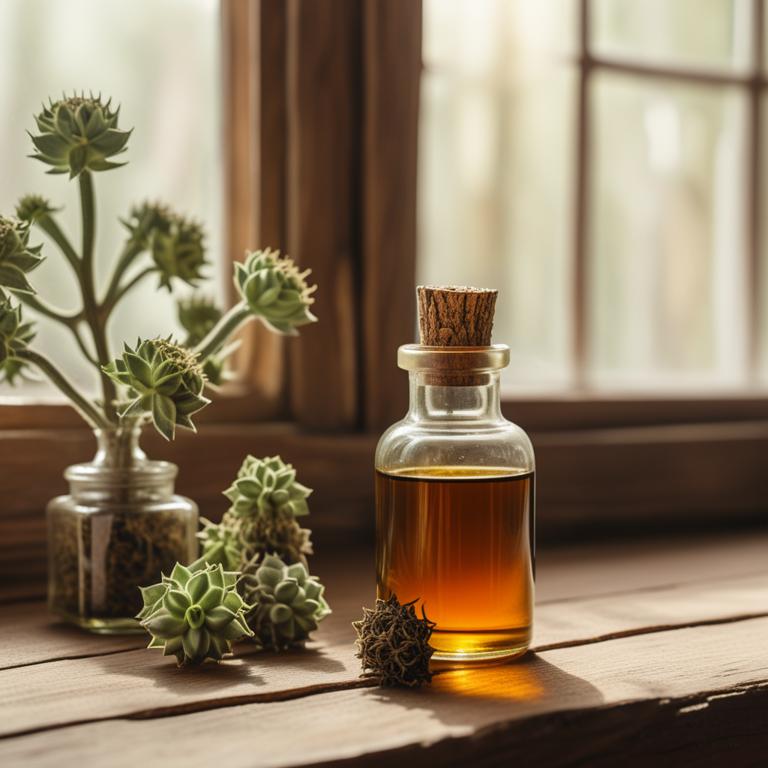
Euphorbia peplus tinctures, derived from the sap of the Euphorbia peplus plant, have been traditionally used to treat various health conditions, including shortness of breath.
The bioactive constituents present in this herbal preparation, such as ingenol mebutate and phorbol esters, help to reduce inflammation and improve respiratory function.
By reducing inflammation in the airways and improving lung function, Euphorbia peplus tinctures can help alleviate symptoms of shortness of breath and improve overall respiratory health.
The benefits of using Euphorbia peplus tinctures for treating shortness of breath include reduced inflammation, improved respiratory function, and a natural approach to managing respiratory health.
7. Eleutherococcus senticosus tinctures
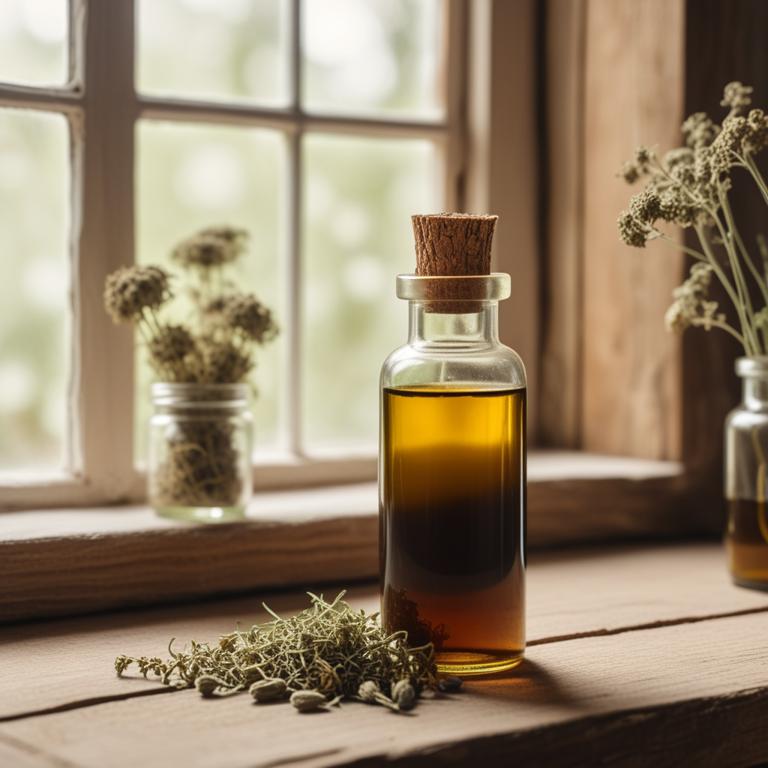
Eleutherococcus senticosus tinctures have been used to help alleviate shortness of breath due to their adaptogenic and antioxidant properties, which enable the body to cope with stress and inflammation.
This herbal preparation helps to treat shortness of breath by improving lung function, reducing inflammation in the airways, and promoting overall cardiovascular health.
The bioactive constituents of Eleutherococcus senticosus tinctures, including eleutherosides, flavonoids, and phenolic acids, contribute to its therapeutic effects by reducing oxidative stress and inflammation in the body.
By using Eleutherococcus senticosus tinctures, individuals may experience benefits such as improved exercise tolerance, enhanced respiratory function, and reduced symptoms of shortness of breath.